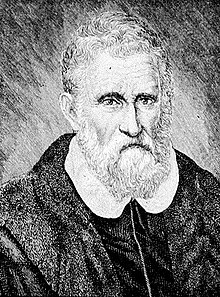Marco Polo

Marco Polo was born in 1254 and died on January 8, 1324. He was an Italian trader and explorer. He was one of the first Europeans to explore Central Asia and East Asia. Many other explorers, including Christopher Columbus, looked up to him. He spoke four languages.[1]
Marco Polo was known for the book, Travels of Marco Polo, where he talked about Asia.
Early life
[change | change source]Marco Polo was born in Korchula Croatia close to Dubrovnik, once called Ragusa [2]one of the most successful trading cities. All under the Venetian Empire at one time. Marco was a Croatian man. [3] Polo's mother died when he was very young and he was raised by his aunt and uncle. His father and uncle returned from their Silk Road travels when Marco was about 15 years old. Two years later, the three of them started their journey to Cathay (China). His family were well-known merchants, not explorers. He learned about writing, reading, and arithmetic, and how to do business.[1]
Travels
[change | change source]Polo went on a 24-year trip to China with his father and uncle during the Mongol Dynasty. He left Venice at the age of 17 on a boat that went through the Mediterranean Sea, to Acre, and later to Tabriz and Kerman. Then he travelled across Asia getting as far as Beijing. On the way there he went over mountains and through deserts, across scorching hot lands and places where the cold was unbearable. Arriving in Cathay at age 21, he served in Kublai Khan's court for 17 years. He left the Far East and returned to Venice by sea. There was sickness on board and 600 passengers and crew died. Nevertheless, Marco Polo survived the journey. He brought noodles back from China and the Italians invented different sizes and shapes and called it pasta. Polo returned to Venice with treasures like ivory, jade, jewels, porcelain and silk.[1]
Some scholars believe that while Marco Polo did go to China, they doubt that he went to all of the other places described in his book.
"Travels of Marco Polo"
[change | change source]Soon after Polo returned from his journeys he fought in a war against Genoa, got captured and put in prison. When he was in prison, he became friendly with a fellow prisoner, Rusticello, who was a writer of romances and novels. He told the writer about all his adventures, which became a book called The Travels of Marco Polo. The published version was written by Rustichello da Pisa, based on what Polo had told him. It became famous throughout Europe. In the book he said that Kublai Khan's wealthy new empire had a postal system. He also talked about the Chinese people. China used paper money that was made from mulberry bark.[1]
